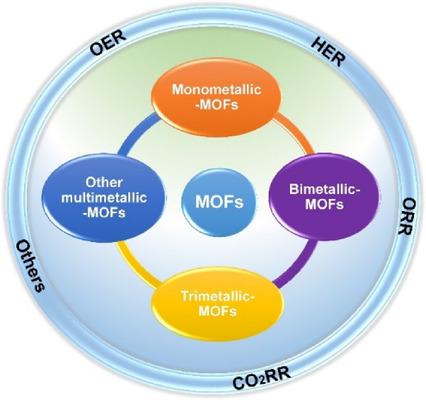当前位置:
X-MOL 学术
›
ChemElectroChem
›
论文详情
Our official English website, www.x-mol.net, welcomes your feedback! (Note: you will need to create a separate account there.)
Pristine Transition‐Metal‐Based Metal‐Organic Frameworks for Electrocatalysis
ChemElectroChem ( IF 4 ) Pub Date : 2019-01-14 , DOI: 10.1002/celc.201801520 Fancheng Sun 1 , Qing Li 1 , Huaiguo Xue 1 , Huan Pang 1
ChemElectroChem ( IF 4 ) Pub Date : 2019-01-14 , DOI: 10.1002/celc.201801520 Fancheng Sun 1 , Qing Li 1 , Huaiguo Xue 1 , Huan Pang 1
Affiliation

|
Pristine metal‐organic frameworks (MOFs) and their composites, which have received wide attention in recent years, especially in the field of electrocatalysis, are emerging as distinctive electrocatalysts for the oxygen reduction reaction (ORR), hydrogen evolution reaction (HER), carbon dioxide reduction reaction (CO2RR), oxygen evolution reaction (OER), and many other electrochemical redox reactions. In this review, the attention is focused on the development of monometallic‐MOFs and multimetallic‐MOFs (including bimetallic‐MOFs and trimetallic‐MOFs) for electrocatalysis in recent years, including their design, catalytic performance and strategies for activity improvement. Finally, major challenges in utilizing pristine MOFs and their composites for electrocatalysis are highlighted.
中文翻译:

原始的基于过渡金属的金属有机电催化框架
近年来,金属-有机骨架(MOFs)及其复合材料受到了广泛的关注,尤其是在电催化领域,它们已成为氧还原反应(ORR),析氢反应(HER),碳的独特电催化剂。二氧化碳还原反应(CO 2 RR),析氧反应(OER)和许多其他电化学氧化还原反应。在这篇综述中,注意力集中在近年来用于电催化的单金属-MOF和多金属-MOF(包括双金属-MOF和三金属-MOF)的开发上,包括它们的设计,催化性能和提高活性的策略。最后,突出了利用原始MOF及其复合材料进行电催化的主要挑战。
更新日期:2019-01-14
中文翻译:

原始的基于过渡金属的金属有机电催化框架
近年来,金属-有机骨架(MOFs)及其复合材料受到了广泛的关注,尤其是在电催化领域,它们已成为氧还原反应(ORR),析氢反应(HER),碳的独特电催化剂。二氧化碳还原反应(CO 2 RR),析氧反应(OER)和许多其他电化学氧化还原反应。在这篇综述中,注意力集中在近年来用于电催化的单金属-MOF和多金属-MOF(包括双金属-MOF和三金属-MOF)的开发上,包括它们的设计,催化性能和提高活性的策略。最后,突出了利用原始MOF及其复合材料进行电催化的主要挑战。


























 京公网安备 11010802027423号
京公网安备 11010802027423号